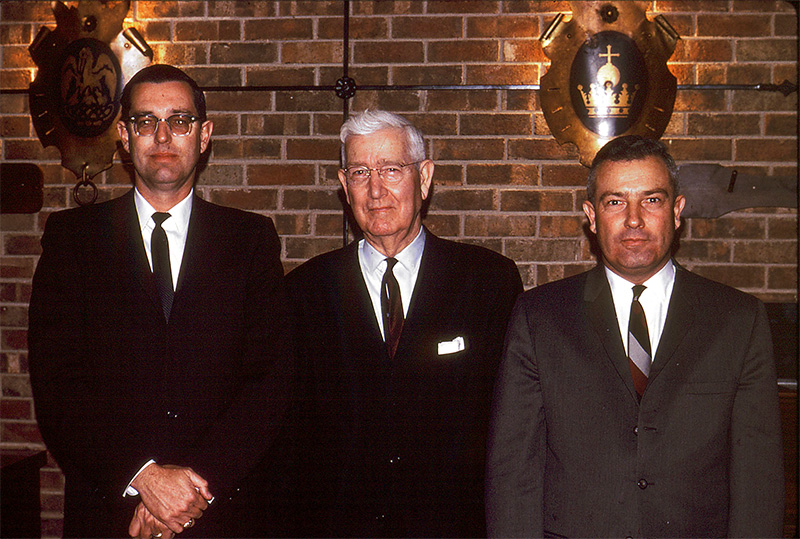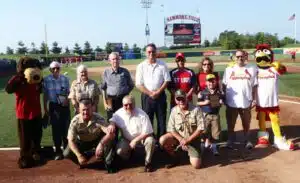Leaders and Legacies: Bob Nichols
As part of our 130th anniversary celebration, we’re recognizing past leaders whose vision continues to drive us forward.
One of my first client rep roles was for one of Bob Nichols’ longtime clients, the City of Grapevine. Bob made sure I was doing my job by asking the City whether their client rep had been by to visit them. If he didn’t get the answer he was looking for, he would let me know in no uncertain terms.
He believed in being professional, which meant being prepared and doing what you say you’re going to do. I remember several occasions when Bob would give me a call, and if I didn’t answer, he would call back an hour later. He then left me a message saying he hoped I did a better job of answering phone calls from our clients than I did answering his.
He’d hold you accountable. He was very straightforward, and you had no problems understanding where he stood. When he said something, he expected you to get it done.
But that’s just Bob.
He also paid close attention to how clients perceived us and our professional appearance.

Right before I started working at Freese and Nichols in 1992, I was chairman of the City of Grapevine Drainage Review Committee. I was told the City Council wanted to recognize our committee. When I arrived, I was informed that I needed to present a summary to the City Council. No problem — except I was dressed in my golf shorts, shirt and flip-flops. During my presentation, Bob Nichols sat on the front row with his serious look and dressed in his dark suit, white shirt and tie. All I was thinking was Bob was going to fire me before my first day of work. After the presentation, Bob shook my hand and said, “Very good presentation. But we have a dress code at Freese and Nichols, and I would advise you to show up in a suit and tie on Monday.” All I could say was, “Yes, sir.” And I showed up in a suit and tie that Monday. For years after that, every time I saw Bob, he would say, “I’m glad to see you dressed appropriately for work today!”
In Bob’s later days, I did see him at work without a tie.
Bob’s leadership had an impact in multiple ways. First, I was fortunate that he hired me. But even more important has been the opportunity to work for and with his son, Mike Nichols. Mike, who retired as Chief Operating Officer in 2021, continued the Nichols family legacy and the ethical approach and client focus that Bob instilled in both of us.
On the project side, Bob was one of the first true environmental engineers, coordinating large-scale, multidiscipline and multiconsultant projects. These included water and wastewater systems and treatment plants, wastewater collection systems, pollution abatement activities and environmental studies. One noteworthy project was the original design and expansion of the City of Arlington’s Pierce-Burch Water Treatment Plant, which was awarded the 1989 EPA Region VI Award for Excellence in Operation and Maintenance.
All of us have Bob to thank for our formal Quality Assurance/Quality Control program. Bob implemented our company code of ethics and client executive visits, and his getting Will Allanach, our current risk manager, connected with our professional liability underwriters, insurers and brokers and was key in helping to educate Freese and Nichols staff.

Bob coordinated an annual tour of offices about risk issues and would typically invite an industry colleague to sit in, help present and do an informal peer review of our operations. Freese and Nichols benefited from outsiders’ input, and their suggestions provided an early nod to benchmarking and best practices to be shared for improving the profession.
Bob spent his entire career protecting the integrity and ethics of engineering. Our profession has been enriched because Bob believed that if engineering isn’t done correctly and ethically, then we are not doing our job to protect the health, safety and welfare of the people.
That’s the responsibility engineers take on, and Bob embodied that belief.
Bob was driven and focused. Through his involvement with the Texas Society of Professional Engineers and the National Society of Professional Engineers, he shaped our industry by overhauling a code of ethics and strengthening professional development in ethics. There are always decisions to be made in engineering, and the core of those decisions is professional ethics.
While he was NSPE president in 1978-79, Bob oversaw changes to the Society’s Code of Ethics, and he later served on the society’s Board for Ethical Review.

During his 67-career at Freese and Nichols, the firm flourished under his leadership. When our firm became incorporated in 1977, he first was vice president, then later was named executive vice president. He was Freese and Nichols’ president from 1988 to 1991 and president emeritus for 23 years.
As president, Bob was responsible for purchasing some of the firm’s first personal computers: That included one in Austin to do traffic impact analysis and Intergraph machines for roadway design. As he walked through the office, he’d look to see if anyone was using the new machines, and if they weren’t, he’d question why not because he knew how much they cost.
He shaped how Freese and Nichols did business and reinforced our dedication to client service. He was known for getting things done for his clients.
A version of this article was originally published Nov. 13, 2019.


